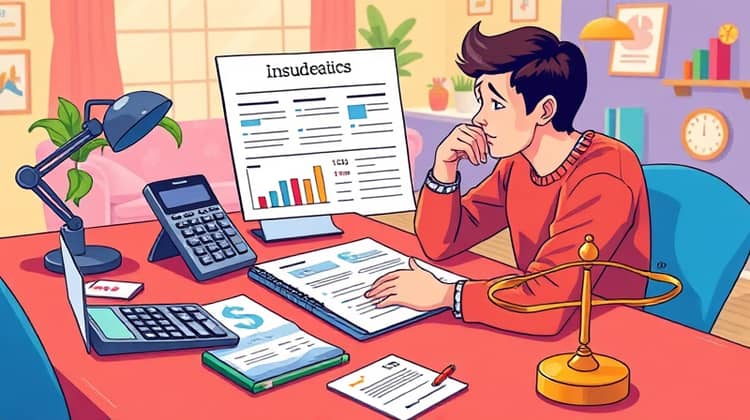In today's world, managing expenses is more crucial than ever. Among various costs, insurance premiums can take a significant chunk out of our budgets, whether for health, auto, or home insurance. Fortunately, there are multiple strategies that can help reduce these premiums, making insurance more affordable while still providing the necessary coverage.
This article will delve into five practical tips that can assist you in lowering your insurance premiums effectively. By being proactive and informed, you can save money without compromising on the protection you need.
Let's explore these tips to find out how to maximize your savings on insurance premiums.
1. Shop Around

One of the most effective strategies for reducing your insurance premiums is to shop around. Insurance rates can vary significantly between providers, so it pays to do your research. Many online tools and resources can help compare multiple quotes from various insurers, giving you the chance to find the most competitive rates.
When gathering quotes, make sure to compare the same coverage levels and deductible amounts. This ensures that the comparisons are accurate and that you’re not overlooking critical details that could affect your overall costs.
- Use online comparison sites to gather multiple quotes.
- Contact local insurance agents to see if they have exclusive deals.
- Don't hesitate to negotiate rates based on competitors' offers.
By shopping around, you can uncover policies that offer better value for money. Even if you are happy with your current provider, it’s worth checking if switching could save you some cash. Never assume that your current insurance company is offering the best deal.
2. Increase Your Deductible

Another effective way to lower your premiums is by increasing your deductible. A deductible is the amount you agree to pay out of pocket before your insurance kicks in during a claim. By selecting a higher deductible, you can often secure lower premium costs in return.
However, it's essential to ensure that you choose a deductible amount that you can afford in case of an emergency or an accident. The idea is to strike a balance between manageable monthly payments and out-of-pocket expenses.
- Assess your financial situation to determine an affordable deductible.
- Consider how often you use your insurance and the typical costs associated with claims.
- Evaluate the potential savings on your premiums against the higher deductible amount.
3. Bundle Your Policies

Bundling your insurance policies can lead to significant savings on your premiums. Many insurance companies offer multi-policy discounts if you combine different types of coverage, such as auto, home, and renters insurance. This not only reduces your overall costs but also simplifies managing your insurance needs.
When you consolidate your policies, you’re also streamlining communication with your insurer, making it easier to handle claims or updates. Additionally, some companies reward long-term customers, giving you another avenue to save.
Before bundling, however, it’s wise to compare the bundled rate with the costs of separate policies to ensure you're getting the best deal. You may find that separate policies are more advantageous depending on your needs.
- Check with your insurance provider for multi-policy discounts.
- Investigate different types of coverage you might need to bundle.
- Review potential savings compared to separate insurance policies.
Bundling can be particularly beneficial for families or individuals with multiple insurance needs, allowing for comprehensive coverage under one provider. It's a win-win scenario that not only saves you money but can also enhance your insurance experience. Plus, dealing with a single insurer can save time and hassle when managing claims or adjustments.
Overall, bundling is a practical approach which not only reduces your insurance expenses but also provides a convenient solution to all your coverage requirements.
4. Improve Your Credit Score

An often-overlooked factor in determining your insurance premiums is your credit score. Insurers frequently use credit scores to gauge the level of risk you pose as a policyholder. In many instances, individuals with higher credit scores receive lower premiums because they are considered lower risk.
To improve your credit score, focus on timely payments, reducing debt, and correcting errors on your credit report. This proactive approach can help secure better rates on your insurance over time.
- Pay your bills on time to improve payment history.
- Reduce credit card balances and overall debt.
- Monitor your credit report regularly for inaccuracies.
Investing time in understanding and enhancing your credit can yield significant financial benefits not just in insurance, but in various aspects of life. The better your credit score, the more negotiating power you have when discussing insurance rates.
5. Ask for Discounts

Many insurers offer various discounts that policyholders might not be aware of. Always inquire about potential discounts when searching for policies or renewing existing ones. Discounts can stem from several factors such as safe driving records, security features in your home, loyalty, and more.
Even being a member of certain organizations or taking specific safety courses can unlock additional discounts, which cumulatively can lead to substantial savings.
- Inquire about safe driver discounts for auto insurance.
- Ask about multi-policy discounts when bundling services.
- Explore discounts for security systems or safety features in your home.
It’s a good practice to regularly check with your insurance provider about any new discounts available or how you might qualify for existing ones. Many policyholders miss out on these simple savings opportunities. Furthermore, it never hurts to ask—insurers prefer proactive customers who seek to maximize their benefits, and negotiating for discounts can create a win-win situation.
Lastly, every little savings counts. Cumulatively, these discounts can significantly lower your overall insurance premiums, contributing to better financial health and reducing stress in your insurance dealings.
Final Thoughts

Lowering your insurance premiums is feasible by being proactive and informed. Implementing the strategies outlined in this article can lead to significant savings and make insurance more manageable without sacrificing coverage quality.
Ultimately, it’s about taking the time to understand your insurance needs and options. The potential savings, both immediate and in the long run, make these efforts worthwhile.














